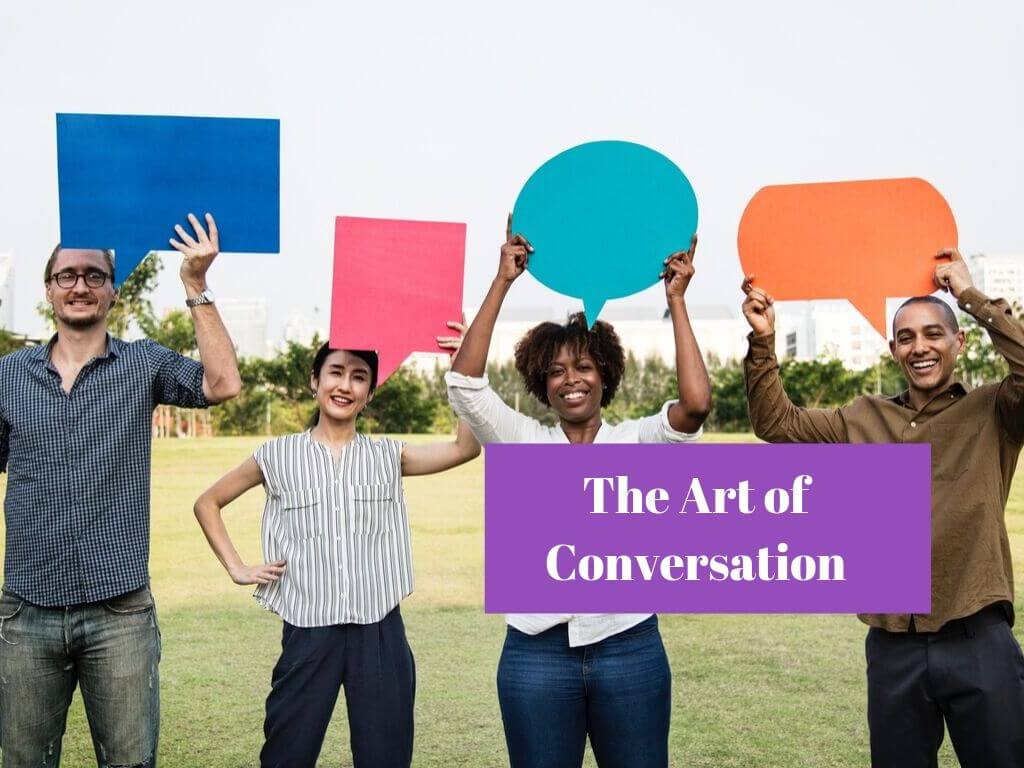
The Art of Conversation
The art of making conversation. How often do you go to an event or a party and realise you really don’t feel like making small talk to other people around the room? You just want to talk to the people you know with minimal effort required and get wrapped up in the cocoon of friends and acquaintances that can look after you and keep you happy. Life is so much easier when we can do this – but that’s not always the case is it?!
Which generation are you part of when it comes to the art of making conversation? Some would say that the millennial generation, the next generation, have a tendency to text everybody through whatever social media programme they use rather than directly start a conversation. Of course, this is a sweeping generalisation – or is it? It’s a text, it’s an Instagram, it’s a post. But the phone isn’t being dialled to have an actual conversation, that art of making conversation is being lost, where people choose to hide behind the screen and send a little message, a few characters and an emoji or a video photo at best. How many people choose nowadays to actually sit down and make conversation, not just about the weather and how a cup of tea would be nice, but generating a conversation where people can become friends, find connections, find support, find out ways to help each other?
What is the art of conversation? We know it’s talking, finding common ground where we can get to know another person, understand more about them and develop friendships both personally and professionally. These conversations can start around subjects from the weather and holidays through to job role, food, music, family etc, the list goes on – we can talk about anything, but we choose not to! Is it a fear of being rejected because this stranger doesn’t have the same tastes or interests as you or is it apathy because you’d much rather be somewhere else instead? If your head is not in the right place, there is not much point in being there.
For many years, I’ve been one of those people struggling to make small talk constantly at events. It’s not that I’m an introvert or an extrovert because generally, I have more extrovert tendencies. However, that whole art of making small talk, introducing yourself, finding out interesting things about the other people, finding out ways that you can connect with the other person so that they’re interested in what you’ve got to do is really hard work. And you also need to become interested in what they’ve got to do. Once you’ve done this once or twice you then have to carry on from there making more conversations, talking to different people. All of this with the hope that you both have a laugh, you enjoy their company, they enjoy yours, and from there it’s possible to work out whether or not there’s a business relationship, a friendship or anything else that can be created.
I was challenged by my coach many years ago to stop being punctual to events. The reason for this was because I worked out how long I could network at an event, how long I could make small talk to people. And I discovered was that after an hour and a half or so I was ‘done’ talking to strangers and making small talk, I had run out of energy and desire. With that in mind, I changed the way I worked it, instead of turning up punctually or even early as was my normal want, I turned up on time, just on time. And instead of half an hour of pleasantries before everything got going, I was able to do the whole event and not get tired or frustrated, because by the time I got to the end of event when the coffee came out I was in a good place with energy to talk.
So a challenge for you is understanding how good you are at the art of conversation, the art of making small talk. What are you going to do to help you get better at it? It’s a craft that we all need and we need to improve on it. As we get better at it, then we create more opportunities for ourselves and others. We can then engage, develop and create more business, create more friendships and have a lot more fun. Your challenge is to go and make small talk, understand how long you can handle making small talk, how long in between conversations and how long you survive. Because if it’s a problem for you and you avoid it the damage you are doing or the lost opportunities you are creating could be huge. It’s time to get help to develop this skill.

